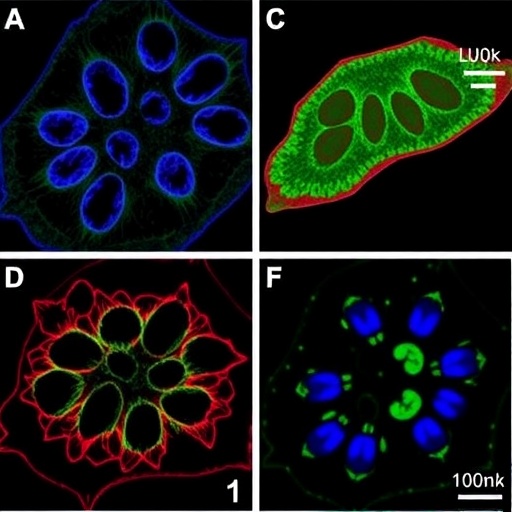Recent research has illuminated a significant mechanism that plays a pivotal role in the aggressiveness of esophageal carcinoma. The study, conducted by Zhu, Zhao, and Cui, reveals groundbreaking insights into how the protein LMNB2 impacts the stemness of cancer cells in the esophagus while simultaneously modulating the Warburg effect via the p38 MAPK signaling pathway. This article disseminates the nuanced interplay between cellular components and cancer biology that could potentially lead to innovative therapeutic strategies.
At the heart of the researchers’ findings lies the protein LMNB2, which has emerged as a crucial player in various cellular processes. The study indicates that LMNB2 regulates not just the structural integrity of the cell nucleus but also influences essential signaling pathways that dictate cell proliferation and survival. This regulation implies that LMNB2 could serve as a potential biomarker for esophageal carcinoma, one of the most challenging malignancies to treat.
The Warburg effect, a term used to describe cancer cells’ preference for aerobic glycolysis over oxidative phosphorylation, is another focus of this research. Cancer cells exhibit altered metabolism, enabling them to survive and thrive in low-oxygen environments typical of solid tumors. The research demonstrates that LMNB2’s modulation of the p38 MAPK pathway significantly enhances the Warburg effect in esophageal carcinoma cells, suggesting that targeting this pathway could lead to groundbreaking therapeutic options.
Delving into the mechanisms of esophageal carcinoma, the study underscores the importance of cancer stem cells, a subset of cells thought to be responsible for tumor initiation and recurrence. These stem-like cells possess remarkable self-renewal capabilities and resistance to conventional treatments. The findings indicate that LMNB2 promotes the stemness of these cancer cells, enabling them to maintain their malignant properties. This discovery opens new avenues for targeting cancer stem cells to improve treatment outcomes.
The p38 MAPK pathway, well-known for its role in cell stress and inflammatory responses, emerges as a pivotal signaling cascade influenced by LMNB2. The researchers present compelling evidence that LMNB2 interacts with key components of this pathway, modulating its activity and consequently altering metabolic processes in esophageal carcinoma. This intricate modulation can lead to an enhanced understanding of how cancer cells adapt to their microenvironment, a crucial aspect in developing tailored therapies.
By harnessing this knowledge, future therapeutic strategies could focus on a multi-faceted approach that debilitate esophageal cancer progression. Inhibitors targeting the p38 MAPK pathway, potentially combined with other metabolic modulators, could revolutionize the treatment landscape for patients suffering from this aggressive cancer type. The study demonstrates that a combative approach against both cancer cell metabolism and stemness may yield substantive clinical benefits.
Additionally, the research opens up a dialogue about the implications of LMNB2 beyond esophageal carcinoma. Given its regulatory roles across various cell types, this protein may have broader implications in other malignancies, sparking interest for cross-cancer thematic studies. Understanding how LMNB2 influences different cancer types could lay the groundwork for universal targets in cancer therapy.
Further investigations are warranted to explore the precise molecular interactions between LMNB2, the p38 MAPK signaling pathway, and cancer stem cell markers. Such studies could unravel additional layers of complexity in cancer biology and refine our therapeutic arsenal. The potential for LMNB2 to become a therapeutic target hinges on further validation of its function and interactions within the context of cancer pathophysiology.
As the scientific community delves deeper into these findings, a collaborative effort across disciplines—molecular biology, oncology, and pharmacology—will likely yield rich insights into the mechanisms governing esophageal carcinoma and potentially other cancer forms. The comprehensive understanding developed through these discussions could lead to the formulation of novel drugs designed to specifically target the pathways discussed.
Moreover, the implications for early detection and screening practices could be transformative. If LMNB2 can be established as a reliable biomarker, it would offer healthcare practitioners a tool for early diagnosis, which may significantly improve patient outcomes. Early-stage interventions are critical in combating esophageal carcinomas, which are notoriously lethal in advanced stages.
Zhu, Zhao, and Cui’s research serves as a beacon of hope for the future of esophageal carcinoma treatment. As the medical community strives to innovate strategies that can outpace cancer’s ability to adapt, foundational studies like this illuminate paths to potentially groundbreaking advancements in oncology. The roadmap forged by this research can enhance the quest against malignancies, leading us closer to a future where precision medicine triumphs over the unpredictability of cancer.
In summary, the exploration of LMNB2’s role in esophageal carcinoma represents a crucial step in understanding the multifaceted nature of cancer biology. As the field moves forward, the insights gained from this study may catalyze new ways of thinking about cancer treatment, with the potential to fundamentally alter the course of esophageal cancer care.
Subject of Research: The role of LMNB2 in regulating esophageal carcinoma stemness and the Warburg effect through the p38 MAPK signaling pathway.
Article Title: LMNB2 Regulates Esophageal Carcinoma Stemness and Warburg Effect by Modulating the p38 MAPK Signaling Pathway.
Article References: Zhu, X., Zhao, X. & Cui, Y. LMNB2 Regulates Esophageal Carcinoma Stemness and Warburg Effect by Modulating the p38 MAPK Signaling Pathway. Biochem Genet (2025). https://doi.org/10.1007/s10528-025-11280-3
Image Credits: AI Generated
DOI: https://doi.org/10.1007/s10528-025-11280-3
Keywords: LMNB2, esophageal carcinoma, stemness, Warburg effect, p38 MAPK signaling pathway.




